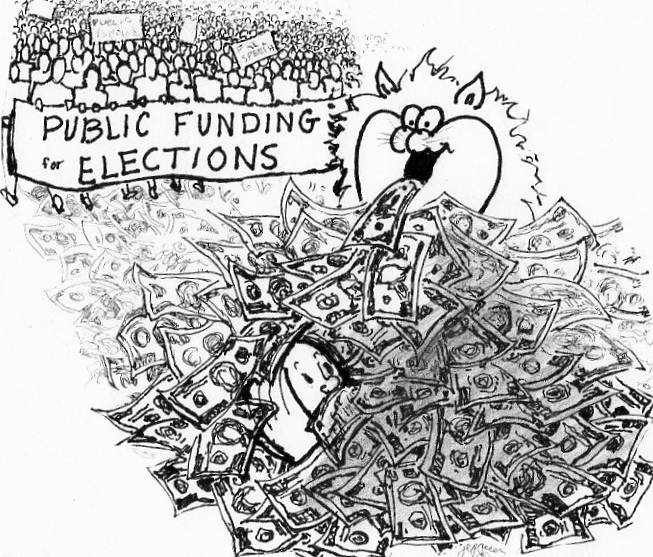Opinion: Clean Election - Vote will
give
Green
Party a great opportunity at polls
By
Kjersten Jeppesen
 The June 2010 California ballot will include the California
Fair Elections Act (CFEA) as a pilot project.
The June 2010 California ballot will include the California
Fair Elections Act (CFEA) as a pilot project.
If passed, CFEA will provide public financing on a voluntary basis for candidates
running for Secretary of State in 2014 and 2018.
Candidates could choose public funding or the traditional method of fundraising.
If candidates choose public funding, they would agree not to accept any private
funding.
To qualify for the public funds, candidates would be required to collect a
specified number of five-dollar "seed money" contributions along
with registered voter signatures.
The donation is to insure that each signature is backed by actual support
for the candidate, to discourage frivolous candidates. Proceeds will go into
the public campaign fund as "seed money." Within 24 hours, candidates
would receive matching funds to counter an opponent's attack.
Major party candidates would be required to collect 7,500 five-dollar donations
and registered voter signatures for the primary election.
"Third" parties and independents would have two options. In order
to receive the full general election baseline funding amount of $1,300,000,
he/she would have to collect twice as many five-dollar "seed money" donations
and signatures ($15,000) as that required by major party candidates.
Or, by gathering 3,750 signatures and donations (half that required for major
candidates), a Green candidate could receive 25 percent of the baseline amount
for the general election, or $250,000. That's still a sizable sum by our standards.
If voters approve CFEA, it would provide a major opportunity for the Green
Party. For the first time, Green candidates would receive public funding in
a general election.
"Third" party or independent candidates could be awarded public
funding in an amount formerly only dreamed about. The challenge is in qualifying.
Qualified candidates would be allowed to place a 250-word statement in the
sample ballot. This alone is a boon for a Green, but the real prize is that
candidates would be required to engage in two public debates in the general
election.
If passed, CFEA will sunset in 2019. Hopefully by then, the pilot project
will have provided enough foundational experience for the public, and California
will go the way of other states in which public funding has been found to be
very successful, and in which the majority of candidates participate.
For example, 81 percent of candidates in Connecticut and 85 percent in Maine
were elected by public funding only, leaving them free of obligation to special
interests. In Arizona, 9 of 11 candidates were elected with public funds only,
and voter turnout increased by 24 percent. CFEA provides that public funds
would come from voluntary contributions designated on state tax returns and
on an increase in the registration fee for lobbyists, lobbying firms, and employers
of lobbyists.
Presently the fee is $12.50 per year, one of the lowest in the U.S. It would
increase to $350, the same as in Illinois. None of the funding will come from
the state's general fund.
Are we ready for the challenge? Shall we start planning now to get out the
vote and counter big money opposition? To study the Secretary of State's office
thoroughly, and find the best qualified Green candidate(s)?
To prepare our candidate(s), and develop and define their positions? To establish
support in preparation for the donation/signature gathering and the final campaign?
We need to be ready. Opportunity awaits.
For more information: see California Clean Money Campaign

